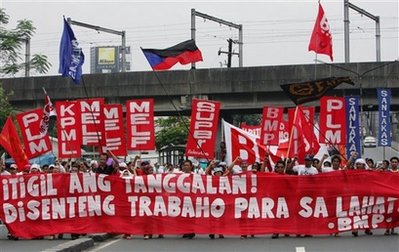All Senators’ bills fail to challenge contractualization
Below is the position paper on the Senate bills on contractualization
and security of tenure of workers issued by the Bukluran ng Manggagawang
Pilipino National Executive Committe on October 13, 2016:
The Bukluran ng Manggagawang Pilipino (BMP) welcomes various
initiatives by lawmakers to address contractualization and other controversies
regarding job security, in the form of legislative proposals to address a
problem, which has long been branded by the organized labor movement as a
scourge on labor rights and welfare.
But all the proposals,
particularly Senate Bills 217 (Hontiveros), 174 (Aquino), 117 (Pimentel), 302
(Zubiri), 329 (Ejercito), 1061 (Poe), and 1116 (Villanueva), fail to address
the legal basis for contractualization; no other than Articles 106 to 109 of
the Labor Code, which pertains to contracting and subcontracting agreements.
As a workers’ organization, we
are not composed of lawyers but of trade unionists who are day-to-day
practitioners of laws on labor relations. But we all still know that provisions
on job contracting undermine Article 280 of the said code, which states that
regular employees are those who perform “usually necessary or desirable” in the
normal operations of a business.
Articles 106 to 109 provides the
loophole for the so-called “principals” in these trilateral agreements to use
contractors and subcontractors that provide cheaper and more docile workers to
carry out work that should be performed by their regular employees.
These provisions not only
obfuscate employee-employer relationships. In the processes of union building,
workers become victims of finger-pointing between principals and the labor
agencies on who should negotiate with the newly-formed union regarding wages,
benefits, and work conditions.
More so, these provisions
reinforce the capitalist blackmail of “work or starve”, as the threat of
unemployment constantly hovers, like Damocles’ sword, on contractual workers
who could be fired anytime by simply terminating their employment contracts.
Contractualization, legalized by
Articles 106 to 109 of the Labor Code, is tantamount to cheap and docile labor.
It is a problem that affects millions, especially if we include the families
who rely on casual workers for their daily sustenance and upkeep.
According to the May 2016 Labstat
Updates of the Philippine Statistics Authority (PSA), based on the 2013/2014
Integrated Survey on Labor and Employment, out of a total of 4.472 million
workers in firms with twenty (20) or more employees, 1.336 million (29.87%) are
non-regular workers. This data does not include those employed in small and
micro establishments, which comprise more than 90% of employers in the country.
If the 1.336 million contractuals
in large firms provide for the needs of a family of five, we have 6.68 million
Filipinos who are affected by low wages and the lack of job security due to
contractualization!
Hence, the BMP believes that only
a bill that would repeal Articles 106 to
109 and the prohibit contracting of
“usually necessary or desirable” work, pursuant to Article 280 of the Labor
Code would actually begin to bring an end to contractualization. Employment of
contractual labor, in order to depress wages and deny regular status to workers
should be regarded as a criminal offense.
Such harsh penalties, as
proposed, are guided by state policies enshrined in the Constitution. Labor,
states Article 2, Section 18, is the “primary social economic force”. Because
labor should enjoy primacy over non-human inputs in production and commerce,
the charter orders the state to provide “FULL PROTECTION to labor” (Article 13,
Section 3, emphasis ours).
The State should guarantee
workers their immutable rights in the work place – a fitting tribute to their
undervalued contribution to economic development. It is hence but appropriate
to treat the deprivation of the workers’ due, their basic entitlements and
social protection as criminal transgressions which must not be countenanced by
the State.
Indeed, the State owes a
ballooning social debt to workers who should, as a matter of Constitutional
mandate, be entitled to living wage, participation in decision-making processes
affecting their rights and benefits, unhampered self-organization, among
others.
Hence, the BMP challenges Congress to tread the right direction, consistent
with this mandate, by plugging the legal loopholes that permit
contractualization and the further detriment of labor rights and welfare.
Ending contractualization, which
has been declared as a policy by no less than President Rodrigo Roa Duterte
himself, is a step in this rightful course.
End contractualization now!
Uphold the right of workers to
security of tenure!




